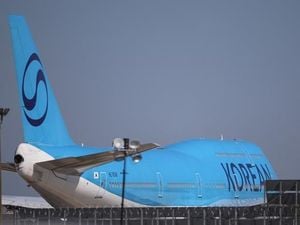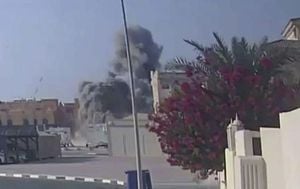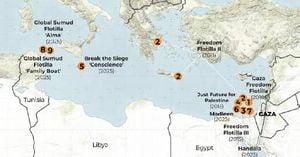President Donald Trump has named Chris Rocheleau as the acting administrator of the Federal Aviation Administration (FAA) amid growing concerns about aviation safety following a tragic mid-air collision near Washington, DC. This appointment, announced just days after the January 29 incident claimed the lives of all 67 individuals aboard two aircraft, highlights the urgent need for experienced leadership at the agency during these trying times.
Rocheleau, who has logged over 20 years at the FAA, takes the helm during what many describe as a pivotal period for aviation safety and regulatory oversight. His extensive background includes serving as deputy administrator of the FAA and chief operating officer of the National Business Aviation Association (NBAA). He was also one of the early leaders at the Transportation Security Administration (TSA), which was established post-9/11.
With the FAA facing scrutiny over its protocols and practices, industry leaders have applauded Rocheleau's appointment. Ed Bolen, NBAA president and CEO, stated, “Chris is an outstanding leader who will be good for the FAA, good for aviation, and good for the country, especially at this challenging time.” Bolen emphasized Rocheleau's commitment to public service, underscoring trust within the aviation community.
The General Aviation Manufacturers Association (GAMA) also expressed support through its president and CEO, Pete Bunce, who noted Rocheleau's deep knowledge of the FAA and its operations. “Mr. Rocheleau's knowledge will serve our nation well, particularly as the FAA responds to and supports the NTSB's midair investigation,” he stated, referencing the urgent need for independent and impartial findings from the National Transportation Safety Board.
The incident leading to Rocheleau's appointment—a collision between PSA Airlines’ CRJ700 jet and a Sikorsky UH-60 Black Hawk—occurred as both aircraft converged over the Potomac River, prompting immediate calls for introspection within the aviation system. The FAA has been under considerable pressure to strengthen safety measures, minimize near-miss scenarios, and improve the national aviation system as challenges mount.
Rocheleau's initiation as acting administrator follows the resignation of previous FAA head Mike Whitaker, who stepped down on January 20, 2025. Whitaker's departure left the FAA without permanent leadership for over a year, which could have contributed to the vulnerabilities exposed by the recent accident.
During his career, Rocheleau has had notable involvement with the FAA's safety initiatives, including his recent position as head of the FAA's safety office, which he assumed after the departure of the previous department head amid significant controversies surrounding Boeing's 737 Max. This extensive experience positions Rocheleau uniquely to tackle the pressing issues within the FAA, particularly as he embarks on addressing operational inefficiencies and working through the significant shortage of air traffic controllers.
Upon taking office, the new acting administrator faces the immediate task of reviewing hiring practices at the FAA—an effort mentioned by President Trump at a recent White House press conference. Under scrutiny were the previous administration's diversity, equity, and inclusion initiatives, which Trump implied had potential ties to the recent accidents.
While the FAA's mandate prioritizes safety, it also involves addressing the environmental impacts of aviation. Rocheleau's background includes awareness of the need for sustainable aviation practices, raising the prospect of innovative strategies within the agency to tackle both safety challenges and environmental concerns.
Industry groups like Airlines for America, represented by its president Nicholas Calio, welcomed Rocheleau's leadership, stating, “Chris’s proven, solid experience will provide smart leadership at this agency, especially during this urgent time.” These endorsements reflect widespread support from within the aviation sector for Rocheleau as capable of guiding the FAA through its current crisis.
Rocheleau's appointment arrives at a moment where the aviation community grapples with heightened safety concerns. Prior to the collision, the U.S. airline industry had not faced any fatal accidents since 2009; recent near-misses at large airports have intensified calls for systemic overhaul and modernization of air traffic control systems to preserve aviation safety.
Beyond merely reacting to the accident, Rocheleau's role will encompass broader strategic planning to strengthen the FAA’s oversight capabilities collaboratively with the National Transportation Safety Board. The board's investigation is expected to provide key recommendations specific to preventing future tragedies within the aviation sector.
Rocheleau holds degrees from Central Connecticut State University and the City University of Seattle, alongside completing executive programs focused on national security at Harvard's Kennedy School. His educational background, combined with his career experience, embodies the qualifications needed to respond effectively to the aviation challenges posed both by the serious accident and the administrative hurdles within the FAA.
Despite the challenges evident upon taking leadership, Rocheleau's reputation as a stabilizing figure within the aviation community may afford him the necessary goodwill to enact meaningful reforms and enhanced regulatory oversight at the FAA, keeping the aviation industry's well-being at the forefront following the tragedy.



